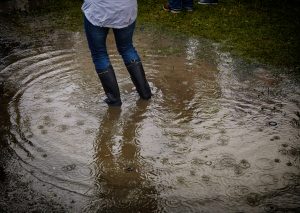
When it comes to retaining walls, one of the most common questions is whether or not they can help keep water and flooding at bay. The answer isn’t always a simple one, as there are several factors that come into play. In this article, we will discuss whether or not a retaining wall will be able to stop flooding, and what coverages you should have in place just in case this ever happens.
What is a Retaining Wall?
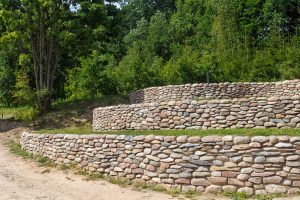 First, let’s start with the definition of a retaining wall. A retaining wall protects from pressure of water, wind, and other natural forces of the planet. In other words, it’s a way to keep things in place – like dirt, rocks, and other materials. By holding the soil back, it helps prevent erosion on the property. Retaining walls are often used in landscaping projects, but they can also be found holding up roads, bridges, and buildings. There are several different types of retaining walls; these include gravity walls, piling walls, cantilever walls, and anchored walls. Typically, a retaining wall is made of materials like stone, concrete, or wood.
First, let’s start with the definition of a retaining wall. A retaining wall protects from pressure of water, wind, and other natural forces of the planet. In other words, it’s a way to keep things in place – like dirt, rocks, and other materials. By holding the soil back, it helps prevent erosion on the property. Retaining walls are often used in landscaping projects, but they can also be found holding up roads, bridges, and buildings. There are several different types of retaining walls; these include gravity walls, piling walls, cantilever walls, and anchored walls. Typically, a retaining wall is made of materials like stone, concrete, or wood.
So how do retaining walls work? Essentially, they use gravity to their advantage. By being built from the ground up, retaining walls can create a “barrier” between the property and any outside forces. For the most part, the weight of the soil or the wall itself is what stabilizes it enough to hold back unwanted forces and debris.
Can a Retaining Wall Fail?
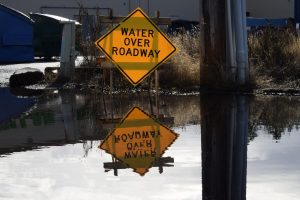 Of course, retaining walls aren’t infallible. If there’s enough water pressure – or if the retaining wall itself is older or in bad shape – then it’s possible for flooding to occur. That’s why it’s always important to consult with a professional before building or repairing a retaining wall. A professional will have a better understanding of what to expect in terms of flooding depending on where you live in the area. From there, they can help determine exactly what kind of retaining wall is needed for your property.
Of course, retaining walls aren’t infallible. If there’s enough water pressure – or if the retaining wall itself is older or in bad shape – then it’s possible for flooding to occur. That’s why it’s always important to consult with a professional before building or repairing a retaining wall. A professional will have a better understanding of what to expect in terms of flooding depending on where you live in the area. From there, they can help determine exactly what kind of retaining wall is needed for your property.
The main reason a retaining wall may fail is thanks to poor drainage from the wall. The drainage acts as a funnel for the water, helping the water escape to prevent pressure from building. Additionally, if the retaining wall footing is too shallow, it will not be able to hold up all of the weight of saturated soil. If you have a gravity wall, you will want to pay extra attention to this. Other reasons a retaining wall may fail include using poor materials to create the wall or if the dynamics of the slope of the wall suddenly changes. Keep in mind, if you add too much unaccounted for weight on top of your retaining wall, that may also cause it to fail.
So, in short, yes – a retaining wall can stop water and flooding. But as with anything, there are no guarantees. It’s always best to be prepared for the worst case scenario.
Importance of Flood Insurance
If you live in an area that’s prone to flooding, then you know how important it is to have flood insurance. But what exactly does flood insurance cover? And do you need it if you have a retaining wall?
First, let’s start with the basics. Flood insurance is a type of property insurance that protects against any damages that may occur on your property due to flooding and other water damages. In other words, it can help cover the cost of repairs if your home or business is damaged by a flood.
You may think that having homeowners insurance will cover everything that happens to your home. However, that is not exactly the case, especially when it comes to flooding. Most standard homeowner’s insurance policies don’t include coverage for flooding, so it’s important to talk to your insurance agent about your coverages, and what you may need to add. You may also be required to purchase flood insurance if you live in a high-risk area or if you have a mortgage from a federally regulated or insured lender.
Does Flood Insurance Cover Retaining Walls?
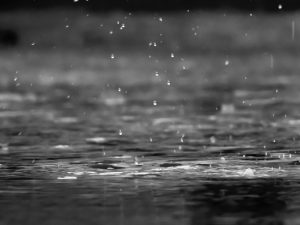 As for retaining walls, they can be covered by flood insurance – but it depends on the situation. If your retaining wall is damaged by a flood, then your policy may help cover the cost of repairs. However, if your retaining wall fails and causes damage to your home or property, then it likely won’t be covered.
As for retaining walls, they can be covered by flood insurance – but it depends on the situation. If your retaining wall is damaged by a flood, then your policy may help cover the cost of repairs. However, if your retaining wall fails and causes damage to your home or property, then it likely won’t be covered.
The bottom line is that flood insurance is an important way to protect yourself and your property – but it’s not a catch-all solution. Make sure to talk to your insurer about what’s included in your policy, and always take precautions to prevent flooding in the first place.
No one likes to think about their retaining wall failing – but it’s important to be prepared for the worst case scenario. This way, if something does happen, you are prepared. So what should you do if your retaining wall does fail and water starts flooding into your home or property?
What to do if Your Retaining Wall Fails
The first thing you should do is call your insurance company. If you have flood insurance, then they may be able to help cover the cost of repairs. Even if you don’t have flood insurance and you only have homeowners insurance, they may still be able to assist you in filing a claim.
Next, you’ll need to start the cleanup process. This can be a daunting task, but there are resources available to help you. The Federal Emergency Management Agency (FEMA) has a website that provides information on what to do after a flood.
And finally, once the immediate danger has passed, you’ll need to start thinking about repairs. If your retaining wall was damaged, then you’ll need to have it repaired or replaced. This is a job best left to the professionals, so make sure to consult with a retaining wall expert before proceeding.
Contact Sound Choice Insurance for Flood Insurance
Dealing with a retaining wall failure can be difficult – but if you’re prepared, then you can get through it. With the help of your insurance company and some professional assistance, you can get your home or property back to normal in no time.
If you are looking for flood insurance to cover your property in the event of a retaining wall failure, contact us here at Sound Choice Insurance! Located on the Crystal Coast of North Carolina, our expert agents are able to help you find the best flood insurance for your property at the most affordable rates. Or, if you currently have flood insurance already, we can look through your policy for you and see if you need any further coverage. Contact us today to get started.


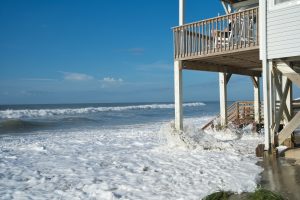
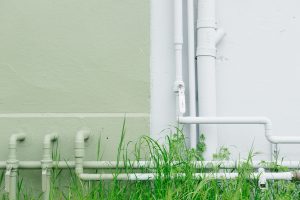



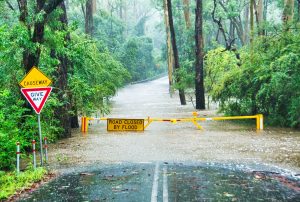


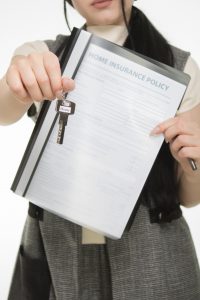 One of the benefits of having all your insurance with one carrier is the convenience of it. It can be much easier to keep track of one bill and make your payments on time when everything is in one place. If you have multiple policies with different carriers, it can be confusing to decipher which bills you have paid, and what they are for. Because of this, you run the risk of missing a payment or getting confused about which company you need to contact for what. However, when you use one insurance provider, the premiums for all of your policies are in one convenient place.
One of the benefits of having all your insurance with one carrier is the convenience of it. It can be much easier to keep track of one bill and make your payments on time when everything is in one place. If you have multiple policies with different carriers, it can be confusing to decipher which bills you have paid, and what they are for. Because of this, you run the risk of missing a payment or getting confused about which company you need to contact for what. However, when you use one insurance provider, the premiums for all of your policies are in one convenient place. So, how do you decide if having all your insurance with one carrier is right for you? There are a few things to consider. First, think about your needs and what’s most important to you. If convenience is a top priority, then keeping all your policies in one place might be the best option for you.
So, how do you decide if having all your insurance with one carrier is right for you? There are a few things to consider. First, think about your needs and what’s most important to you. If convenience is a top priority, then keeping all your policies in one place might be the best option for you.
 The key differences between life and AD&D insurance are:
The key differences between life and AD&D insurance are: Another benefit is that insurance agents can help you compare rates and coverage from different companies. A good insurance agent will weigh both the cost and value of the coverage to decide what is best for you. This can be a huge time saver, as you won’t have to do all the research yourself.
Another benefit is that insurance agents can help you compare rates and coverage from different companies. A good insurance agent will weigh both the cost and value of the coverage to decide what is best for you. This can be a huge time saver, as you won’t have to do all the research yourself.  Here, we have put together a few major things to check about your
Here, we have put together a few major things to check about your